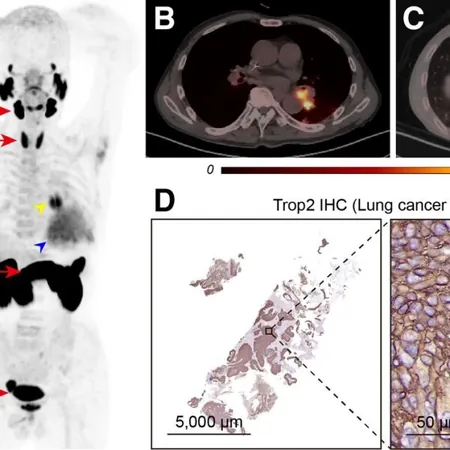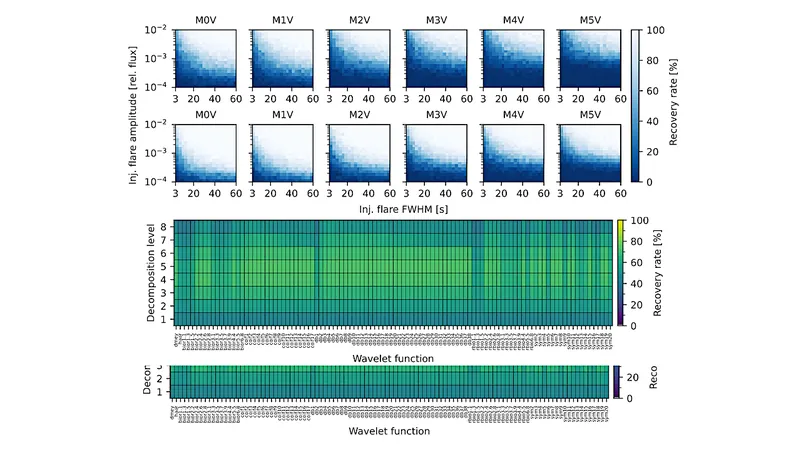
Breakthrough in Cancer Detection: New Radiotracer Reveals Game-Changing Biomarker!
2024-12-24
Author: Li
Introduction
In a groundbreaking study published in the Journal of Nuclear Medicine, researchers unveiled a new molecular imaging agent capable of accurately targeting a critical biomarker associated with various cancers. This advancement is set to revolutionize diagnostic procedures, enhance personalized treatment strategies, and enable precise assessment of tumor responses to therapies.
The Importance of Trop2
The biomarker in question, trophoblast cell surface antigen 2 (Trop2), has gained significant attention among oncologists due to its involvement in crucial processes like cell renewal, proliferation, and organ development. Trop2 is often present in aggressive cancers, including triple-negative breast cancer, colorectal cancer, gastric carcinoma, pancreatic cancer, and non-small cell lung cancer.
Expert Insights
Dr. Weijun Wei, an associate research professor at Renji Hospital School of Medicine, Shanghai Jiao Tong University, emphasized the potential of Trop2 as an emerging biomarker in developing advanced diagnostic and therapeutic agents for solid tumors. "Trop2-targeted therapies could be a game-changer for cancer treatment," stated Dr. Wei, highlighting the urgency of optimizing the visualization of Trop2 expression to select patients who could benefit from these innovative therapies.
Radiotracer Development
To further this initiative, Dr. Wei and colleagues devised two novel Trop2-targeted radiotracers: 18F-AlF-RESCA-T4 and 18F-AlF-RESCA-RT4. Extensive preclinical studies, including imaging and blocking tests on tumor-bearing mice, evaluated the safety and effectiveness of these agents. Moreover, a pilot clinical trial involving three patients suspected of having lung cancer was conducted. This trial compared the performance of the new radiotracers against a previously established agent, 68Ga-NOTA-T4.
Trial Results
The results from the trial were promising. Both 18F-AlF-RESCA-T4 and 18F-AlF-RESCA-RT4 demonstrated significant tumor uptake, but notably, 18F-AlF-RESCA-RT4 exhibited lesser kidney accumulation. In direct comparisons, 18F-AlF-RESCA-T4 emerged as the superior agent, successfully visualizing Trop2 expression in patients while effectively distinguishing cancer from lung inflammation, such as tuberculosis.
Clinical Implications
"The application of PET imaging using 18F-AlF-RESCA-T4 allows healthcare providers to identify patients with Trop2-positive tumors, facilitating the administration of targeted treatments," Dr. Wei explained.
Conclusion
The implications of this research extend beyond diagnostic clarity; they also promise a brighter future for cancer therapy, possibly leading to tailored treatment plans that align more accurately with individual patient profiles.
Looking Ahead
This pioneering study not only marks a significant stride in oncological imaging but also opens the door to more personalized and effective cancer treatment modalities. With further research and clinical validation, the development of Trop2-targeted therapies could profoundly alter the landscape of cancer care.
Stay tuned as this story unfolds, and keep an eye out for future breakthroughs that may reshape cancer treatment as we know it!





 Brasil (PT)
Brasil (PT)
 Canada (EN)
Canada (EN)
 Chile (ES)
Chile (ES)
 España (ES)
España (ES)
 France (FR)
France (FR)
 Hong Kong (EN)
Hong Kong (EN)
 Italia (IT)
Italia (IT)
 日本 (JA)
日本 (JA)
 Magyarország (HU)
Magyarország (HU)
 Norge (NO)
Norge (NO)
 Polska (PL)
Polska (PL)
 Schweiz (DE)
Schweiz (DE)
 Singapore (EN)
Singapore (EN)
 Sverige (SV)
Sverige (SV)
 Suomi (FI)
Suomi (FI)
 Türkiye (TR)
Türkiye (TR)